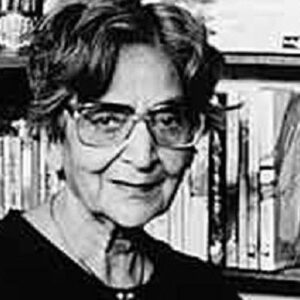Amrita Pritam, the young poet who invoked Waris Shah emotively in what would become her most famous poem, ‘Ajj aakhaan Waris Shah nu,’ was one of India’s foremost female writers in the twentieth century. Pritam, who wrote in Punjabi and Hindi, was a fearless and courageous woman who, unlike the more subjugated women of her time, lived life on her own terms. She was a prolific author, having written over 100 books, which included poetry collections, fiction, biographies, and essays. She witnessed the horrors of the partition as a young woman, an experience that shook her to her core and shattered her soul. She expressed her anguish in the poem ‘Ajj aakhaan Waris Shah nu’ in the aftermath of the heinous experience, reflecting the sense of hopelessness, terror, and sadness that swept over everyone who witnessed the partition. Her experiences during the partition inspired her to write the novel ‘Pinjar,’ in which she addressed women’s helplessness at the time. Through her poignant writings, she established a voice for women in Punjabi literature and established herself as the leading Punjabi poet of the twentieth century. Her works have been translated into a number of languages, both Indian and foreign.
Childhood & Adolescence
She was born Amrita Kaur in Gujranwala, Punjab, in undivided British India on 31 August 1919. She was the only child of Sikh couple Kartar Singh and Raj Bibi. Her father was a poet and a teacher. She was raised in a spiritual environment and inherited her father’s passion for writing.
Her family was extremely religious, as her father was also a “pracharak”—a Sikh preacher. Her orthodox grandmother served Hindus and Muslims separately with separate sets of utensils. Amrita was a critical thinker from an early age and was opposed to such practices.
Amrita’s family suffered tragedy when her mother died when she was only 11 years old. The small child had prayed earnestly to God to save her mother and then ceased praying when her mother died despite her prayers.
She relocated to Lahore with her father and quickly became overwhelmed by household chores. She was depressed and lonely and turned to writing for solace.
When she was sixteen years old, her first anthology of poems, ‘Amrit Lehran’ (Immortal Waves), was published. Around this time, she married and changed her name to Amrita Pritam.
Career of Amrita
Once she began writing in 1936, she continued to write prolifically, publishing six collections of poems by 1943.
Initially, she wrote romantic poems, but she became attracted to and a member of the Progressive Writers’ Movement, a literary movement in pre-partition British India.
In 1944, she published her poetry collection ‘Lok Peed’ (People’s Anguish), in which she lashed out at the war-torn economy in the aftermath of the 1943 Bengal famine. She was maturing into a fearless writer who spoke her mind without fear of repercussions.
In the mid-1940s, she became involved in social work and worked for a time with the Lahore Radio Station.
When India was partitioned in 1947, she witnessed unspeakable horrors firsthand. Over a million people—Muslims, Sikhs, and Hindus—died in horrific communal riots. Amrita, a young woman of 28, narrowly escaped being murdered, but the experience shattered her soul.
As a Punjabi refugee, she relocated from Lahore to New Delhi and struggled to rebuild her life. Stuck in a meaningless marriage, weary of heart, and pregnant in 1948, she expressed her feelings in the poem ‘Ajj akhaan Waris Shah nu,’ invoking Sufi poet Waris Shah.
In 1950, she published the novel ‘Pinjar’ (Skeleton), in which she detailed the women’s plight during the partition. The novel depicts the helplessness felt by women during that era when they were subjected to indifference by their own families. The novel was subsequently adapted into a critically acclaimed Hindi film of the same name.
She worked for All India Radio’s Punjabi service in Delhi until 1961. Clearly, she became more feminist in her writings during the 1960s. ‘Kaal Chetna’ (Time Consciousness), ‘Agyat Ka Nimantran’ (Call of the Unknown), ‘Kala Gulab’ (Black Rose), ‘Rasidi Ticket’ (The Revenue Stamp), and ‘Aksharon kay Saayee’ are among her later works (Shadows of Words).
Significant Works of Amrita
Her most famous novel, ‘Pinjar’ (Skeleton), is a Punjabi novel about a Hindu girl named Puro who is kidnapped by a Muslim boy and is denounced by her own family when she escapes and returns to them. This work established her as a spokesperson for the women who endured incalculable suffering during the partition.
Awards and Accomplishments
In 1956, she received the Sahitya Akademi Award for her novel ‘Sunehey’ (Messages). The Bhartiya Jnanpith Award, one of India’s highest literary honors, was bestowed upon her in 1982 for ‘Kagaj te Canvas’ (Paper and Canvas). In 2004, she was also awarded the Padma Vibhushan, India’s second highest civilian honor.
Personal History and Legacies
In her youth, she was engaged to Pritam Singh, the son of a hosiery merchant. He later became an editor, and the couple married in 1936. The couple was blessed with two children. Her marriage was troubled, and she divorced him in 1960.
She was rumored to be in love with poet Sahir Ludhianvi and to have written about him in her autobiography, ‘Rasidi Ticket’ (Revenue Stamp).
She developed a long-lasting relationship with the renowned artist and writer Imroz, with whom she shared her final 40 years. She passed away on 31 October 2005, following a lengthy illness.
Estimated Net Worth
The net worth of Amrita is $1-$5million.


